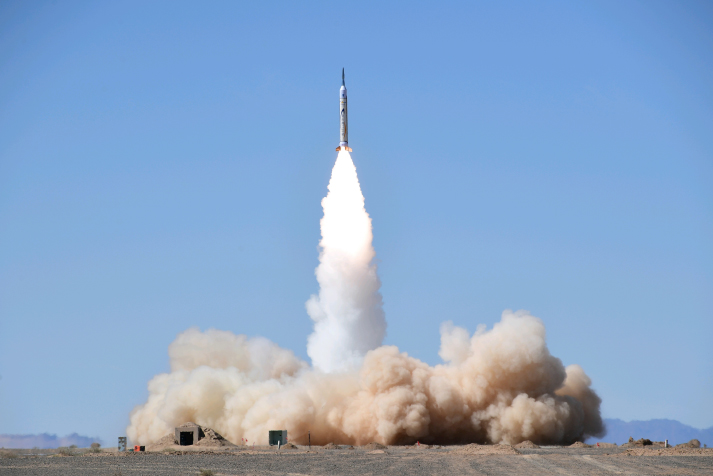| Business |
| Trial and Error | |
| Undeterred by the failure of the its private satellite launch, China's private space industry set for relaunch | |
|
|
 Spectators watch China's first private three-stage carrier rocket, the ZQ-1, take off from the Jiuquan Satellite Launch Center on October 27. The rocket failed to put the satellite it carried into orbit (VCG)
Since its establishment in 1958, the Jiuquan Satellite Launch Center in northwest China's Gobi Desert has witnessed more than 110 freeze-frame moments of successful launches, including the country's first satellite Dongfanghong-1 in 1970, the Shenzhou 5 manned spacecraft that carried the first Chinese astronaut into space in 2003 and two Tiangong space laboratories in 2011 and 2016. But a departure on October 27 broke the longtime record of success in the center's history, when the ZQ-1, China's first three-stage carrier rocket built by a private company to carry small payloads, blasted off at 4 a.m. The solid propellant launch vehicle is 19 meters tall and has a takeoff weight of 27 tons. Unfortunately, it failed to reach its intended orbit. LandSpace, the Beijing-based private rocket manufacturer that developed the ZQ-1, said the rocket's first and second stages worked well and the payload separation was as expected. The malfunction occurred only at the third stage. However, Zhang Changwu, CEO of LandSpace, sees a silver lining in the debacle. "We succeeded in launching the rocket," Zhang told the media. "The experience we gained from evaluating the rocket's flight conditions will help us remodel the rocket as well as advance new rocket research and development." Despite its limited success, LandSpace's trial won applause from the public because the launch represents the development of China's commercial space industry. In the past, the state had a monopoly in China's aerospace exploration industry. As private manufacturers are entering the sector, it's important for these newcomers to gain experience from errors and forge ahead.  The OS-X1 suborbital rocket developed by One Space, a private Chinese company, blasts off from the Jiuquan Satellite Launch Center in northwest China's Gansu Province on September 7 (XINHUA)
Supportive measures
"This is the best era for the commercial aerospace industry," Zhang said at a forum on aerospace in Harbin, northeast China's Heilongjiang Province, in April. His company was the first private enterprise in China allowed to join the rocket market and also the first to acquire a license for launching carrier rockets. Zhang attributed the growth to the global trend of space industry commercialization and favorable government policies. State-owned companies and institutes dominated China's aerospace exploration until 2014, when private companies were allowed to develop and launch rockets. China's Space Activities in 2016, a white paper issued by the State Council Information Office, said "non-governmental capital and other social sectors are encouraged to participate in space-related activities, including scientific research and production, space infrastructure, space information products and services, and use of satellites to increase the level of commercialization of the space industry." According to the document, the government has increased its cooperation with private investors, and the mechanism for government procurement of astronautic products and services has been improved. The private carrier rocket has a huge market in the satellite launch business. As the cost of a rocket launch continues to decrease due to market competition and technological advancements, enterprises will be ready to pay for their satellites. LandSpace already has an order from Danish company GOMSpace, which was placed in January, marking the first rocket launch service order from an international client to a Chinese private enterprise. The lucrative market and policy support have encouraged more private entrepreneurs to embrace rocket research and development. Today, there are at least nine private space startups in China, like LandSpace, Space Honor and One Space, according to Itjuzi.com, a database of Chinese companies. They are growing fast since their establishment two or three years ago. In 2018 alone, there have been five private rocket launches, with three of them fired from the Jiuquan Satellite Launch Center. Among them, the SQX-1Z suborbital rocket, developed by iSpace, a Beijing-based private rocket company, was successfully launched in September, sending three CubeSats miniature satellites into orbit for two Chinese commercial companies. Long way to go The fledgling Chinese commercial rocket industry still has a long way to go. For aerospace manufacturers, funding is crucial. According to Tianyancha.com, a database of registered Chinese companies, by May 4, LandSpace had raised nearly 500 million yuan ($72.3 million) since 2015, with some state funds from Huzhou, a city in Zhejiang Province, and Xi'an, capital of Shaanxi Province. However, it is far from enough to compete with state-owned aerospace companies. A tech-heavy and innovation-intensive industry, aerospace requires talent. Space technologist Huang Zhicheng told Nanfang Metropolis Daily, a leading newspaper in Guangzhou, Guangdong Province, that although the researchers and engineers in some private space companies are from state-owned aerospace institutes, none held the post of deputy chief designer or above in their original agencies. In terms of quantity, space startups with less than 200 people can't hope to be on par with state-owned companies. "China encourages the development of private aerospace companies, but we should be aware of the gap between private and state-owned enterprises. The commercial aerospace industry has a long way to go," Huang said. So far all the private rockets launched in China used solid-propellant engines. They are not as cost effective as liquid-fueled reusable rockets which are much cheaper in the long run. To do this, private companies would have to invest substantially more in research, which is problematic for space startups. Zhang said opportunities for private companies lie in developing differentiated strategies and technologies where the complementary advantages of the private sector and state-owned enterprises could be utilized. It is challenging but essential for both sides to explore an open mechanism of cooperation. If the ZQ-1 mission had been successful, then Future, the small satellite it carried, would have been put in service for state broadcaster China Central Television. Still, the future is not altogether bleak for China's private rocket industry. It is marching ahead despite challenges and work has already started on a new carrier rocket, the ZQ-2. Copyedited by Sudeshna Sarkar Comments to zhangshsh@bjreview.com |
|
||||||||||||||||||||||||||||
|